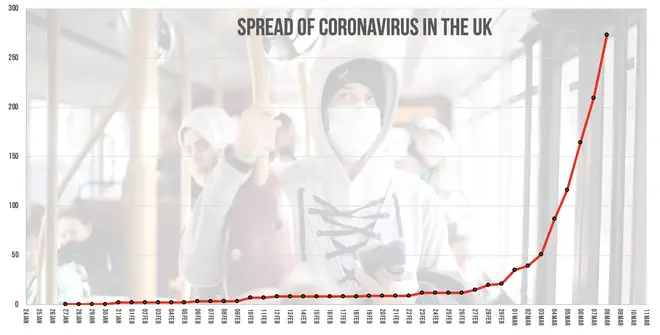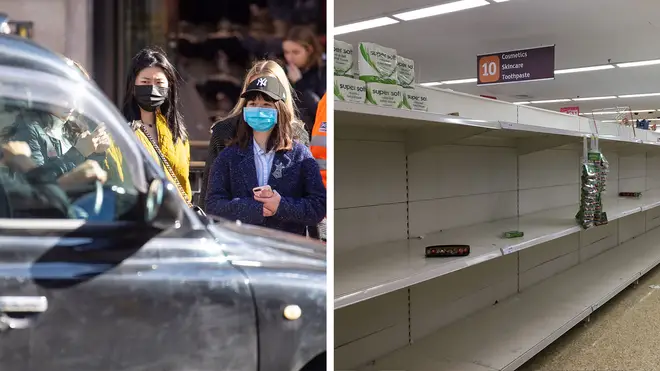
Ian Payne 4am - 7am
9 March 2020, 07:53 | Updated: 9 March 2020, 08:24
Boris Johnson will chair the latest Cobra meeting this morning to consider further measures to prevent the spread of coronavirus. Here's what you need to know about COVID-19 today.
The number of cases of coronavirus in the UK has risen to 278 - and a third person has died after becoming infected.
The man in his 60s had underlying health problems and died in hospital in Manchester after recently returning from Italy.
A spokesman for the hospital said: "We can confirm that sadly a patient being treated for Covid-19 has died at our specialist regional Infectious Diseases unit at North Manchester General Hospital. The man in his sixties tested positive after travelling to Italy and had a number of underlying health problems."

The meeting of the top Government officials will decide if the country should officially move from the "contain" to the "delay" phase of the "battle plan" to deal with coronavirus.
Changing the response status would need the agreement from England's chief medical officer Chris Whitty and chief scientific adviser Sir Patrick Vallance, who are due to be at the high-level discussions.
Among the things expected to be discussed is whether to follow other countries in closing schools and banning indoor public events.
Mr Johnson is expected to tell those in attendance: "The number of coronavirus cases continues to rise in the UK and around the world. We are well prepared and will continue to make decisions to protect the public based on the latest scientific advice.
"Tackling coronavirus will require a national and international effort. I am confident the British people are ready to play their part in that. The most valuable thing people can do is wash their hands with soap and water for 20 seconds."
READ MORE: What's it like to have coronavirus? UK survivor tells LBC

16 million people in Italy have been quarantined in the highly-affected northern regions.
The country has now registered more cases of coronavirus than any country outside China, while its death toll has risen to 366. The number of confirmed cases is 7.375, up from 5,883 the previous day. The number of deaths rose from 233 to 366 on Sunday - the steepest daily rise in fatalities since the outbreak began.
Prime Minister Giuseppe Conte signed a decree just after midnight, which affects about 16 million people in the north of Italy, including the Lombardy region and at least 14 provinces in neighbouring regions. The measures will be in place until April 3.
The Italian tourism industry has taken a huge hit - the Vatican's museums, including the Sistine Chapel, are closed.
Serie A football matches, including the big match between Inter Milan and Juventus, were played behind closed doors.

Saudi Arabia is closing all schools and universities from today, following similar moves in central China, Japan and other Gulf countries.
France and Germany have both held emergency security meetings as the number of cases in each country surpassed 1,000.
In Bulgaria, all indoor public events have been banned.
There has been some criticism of the UK's response to keep the outbreak in Italy away from the UK. A number of patients say they have arrived from Northern Italy with no checks on their health.
But GP Dr Ellie Cannon told LBC why passengers coming off flights from the country aren't being tested.
She said: "We don't have instant testing. You can take someone's temperature, but it may be that they've taken a couple of paracetamol on the plane, so that may be inaccurate.
"At the moment, we don't have any 10-minute or quick-turnaround test - and that's a lot of resources. Far better that everyone goes home, isolates and we do it that way."
The Government is setting up a specialist unit to counter fake news about the coronavirus outbreak.
Housed in the Department for Digital, Culture, Media and Sport, the unit will identify false information being deliberately spread online.
Culture Secretary Olliver Dowden said defending the UK from misinformation was a top priority and expert teams have been brought together to respond to any threats identified.